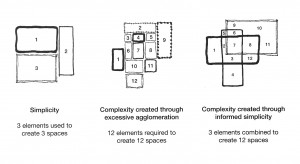Matthew Frederick in 101 Things I Learned in Architecture School (The MIT Press, 2007) after saying how to draw a line, also says that there are three levels of knowing:
-simplicity, is the world view of the child or uninformed adult, fully engaged in his own experience and happily unaware of what lies beneath the surface of immediate reality.
-complexity, characterizes the ordinary adult world view. It is characterized by an awareness of complex system in nature and society but an inability to discern clarifyng patterns and connection.
-informed simplicity, is an enlightened view of reality. It is founded upon an ability to dicern or create clarifying patterns within complex mixtures.
Frederick’s diktat: create architectural richness through informed simplicity or an interaction of simples rather than through unnecessarily busy agglomerations. Whether an architectural aesthetic is intended to be minimalist or complex, its expeÂrience mysterious or clear, its spaces Spartan or richly layered, a building must be a highly ordered thing. Creating simplifying patterns in a building plan is a way of lending order while allowing multiple readings and experiences. Some examples of unnecessary complexity:
-making a dozen separate design moves when three well-informed moves can accomplish as much;
-busying up a project with doodads because it is boring without them;
-agglomerating many unrelated elements without concern for their unity because they are interesting in themselves.
…
but when you set up complexity there’s need to call it informed simplicity? especially when you confuse complex with complicated?



[…] Informed simplicity politecalab Matthew Frederick in 101 Things I Learned in Architecture School (The MIT Press, 2007) after saying how to draw a line, also says that there are three levels of knowing: -simplicity, is the world view of the child or uninformed adult, fully engaged in his own experience and happily unaware of what lies beneath the surface of immediate reality. -complexity, characterizes the ordinary adult world view. It is characterized by an awareness of complex system in nature and society but an inability to discern clarifyng patterns and connection. -informed simplicity, is an enlightened view of reality. It is founded upon an ability to dicern or create clarifying patterns within complex mixtures. (Visit Link) […]
June 13th, 2008 at 6:07 am